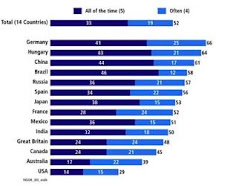
http://www.michaelmoore.com/sicko/
MichaelMoore.com
http://www.michaelmoore.com/words/latestnews/index.php?id=11094By Aaron Smith / CNNMoney.com
NEW YORK (CNNMoney.com) -- Democrats have long served as the traditional enemy of Big Pharma, but in this presidential campaign, the left is taking the lion's share of drugmaker
money.
Democratic senators Barack Obama and Hillary Clinton are the top recipients of donations from the pharmaceutical industry, according to The Center for Responsive Politics, a non-profit, non-partisan
research group in Washington, D.C. Meanwhile, donations to Sen. John McCain, who was recently endorsed by President Bush as the official Republican candidate, pale in comparison.
Obama maintains a slight edge over his Democratic rival, with $181,000 in Big Pharma$ donations through Jan. 31, compared with Clinton's $174,000, according to the center. McCain is far behind with $44,000.
This is in spite of the fact that all three candidates have consistently bashed the pharma industry and vowed to lower drug prices, which would take a bite out of corporate profits.
But it wasn't always this way. Big Pharma, voting with its wallet, used to be more of an enthusiastic supporter for the Grand Old Party.
In the 2004 presidential election, drugmakers donated $516,000$ to the Bush campaign, a huge increase over the $280,000 provided to Sen. John Kerry, the Democratic candidate from Massachusetts, according to the center.
A changing climate
There are two reasons for the recent shift in funding. The Bush administration may still control the White House, but Republicans no longer control Congress. Democrats hold the majority in the House, and the parties are evenly split in the Senate. Drugmakers could be trying to secure access to the ruling party by courting their traditional enemies.
"Since the Democrats took control of Congress in 2006, money has shifted away from Republicans, to the Democrats who hold the keys to the kingdom," said Massie Ritsch, a spokesman for The Center for Responsive Politics. "The pharmaceutical industry is one that would lean Republican if it didn't have to make friends with the party that's in power right now."
Merck spokesman Ron Rogers said his company has never announced support for a specific candidate and "has always sought to work with both Republicans and Democrats on the issues that affect pharmaceutical innovations whether one party or the other has controlled the Congress of White House."
Schering-Plough spokesman Steve Galpin said his company has not donated to any presidential candidates. Other drugmakers contacted on this issue - Pfizer and Eli Lilly & Co. - did not comment by press time.
Secondly, the distinctions have blurred between the two parties' relationship with big business. Democrats have traditionally been seen as enemies to the pharmaceutical industry, while Republicans are supposed to be their allies.
"I think what you can say about the philosophical divide is that the Republicans as a party believe in free markets and the Democrats want to socialize our healthcare system," said Barbara Ryan, pharma analyst for Deutsche Bank North America.
But with McCain as the conservative contender for the White House, the issues are no longer black and white. Ryan noted that the current campaign lacks hard and fast party differences in healthcare. In fact, the policies from of Clinton, Obama and McCain are uniformly unfriendly toward Big Pharma.
The high cost of prescriptions
Much of their political ire is focused on drug prices. All the candidates co-sponsored a bill early last year to allow the re-importation of U.S.-made drugs back from Canada, where they're cheaper. But the bill failed to pass the Senate.
McCain, who has described himself as "the biggest enemy of the pharmaceutical industry in Washington," has been particularly vocal on re-importation.
"Why shouldn't we be able to re-import drugs from Canada?" he asked during the New Hampshire republican debates in January. "It's because of the power of the pharmaceutical companies."
"Don't turn the pharmaceutical companies into the big bad guys," countered Mitt Romney, the former presidential candidate who has since dropped out of the race.
"Well, they are," said McCain.
Campaign crosshairs are also focused on the Bush administration's ban on drug-price negotiations between the government and drug companies. This ban was included in the 2003 Medicare Modernization Act. Removing it could result in lower drug prices, which would put the squeeze on pharma sales.
Obama and Clinton have clearly stated that they oppose the ban on price negotiations.
"[Clinton] has been very much against the non-negotiation ban, said Gene Sperling, her economic advisor, as well as former director of the National Economic Council for former President Bill Clinton. "She feels that that puts the government in a worse position than a big company."
Obama, on his campaign Web site, has vowed to repeal the ban that prevents the government from negotiating with drug companies, estimating it could result in savings of up to $30 billion$ for patients.
McCain's stance on this issue isn't clear. When Democrats failed to pass a bill last year that would have eliminated the ban, he wasn't present for the vote. McCain's office did not return calls and emails asking about his position on this issue.
Business as usual
But even with all the political rhetoric, Wall Street doesn't seem to be paying attention.
Paul Alan Davis, manager of Charles Schwab's $800 million healthcare portfolio$, which includes holdings in Pfizer (PFE, Fortune 500), Merck (MRK, Fortune 500), Johnson & Johnson (JNJ, Fortune 500), Schering-Plough (SGP, Fortune 500) and other major pharma companies, said he wasn't sure which of the
candidates posed the biggest shake-up for the industry - if at all. He also said that the campaign is not a factor in his investment decisions.
"I think it's probably
easier to talk about change to get votes than it is to actually change the system," he said.
| http://www.michaelmoore.com/words/latestnews/index.php?id=11094 Generated on: Thursday 13th of August 2009 04:47:34 PM | Site Created by Plank |
Good health is the will of God for each and every one of Gods children. Death, disease, and pain did not exist in the garden of Eden, and Revelation tells of a new heaven and new earth, where once again they will not exist. In the fallen world in which we live, injury and sickness are a fact of life; physical death on this earth will never be overcome. But scripture paints a clear picture that health was Gods intent from the beginning and will be the goal once again in the end. This means that on a personal, national, and global level the physical well-being of all Gods children is close to Gods heart -- and should be close to ours as well. There is no religious mandate for a specific, God-ordained system of health care or insurance. No amount of biblical exegesis will lead you to a policy conclusion about health care savings accounts, personal versus employer-provided insurance, single-payer public systems, or private insurance plans. Luke might have been a physician, but he never commented on whether or not computerizing medical records should be a national priority. But these policy questions are still of vital importance. And, as they will be debated in the coming months at the White House, in Congress, and in the press, they should also be discussed in our churches. With an issue like health -- deeply personal but of great public concern -- the faith community has a unique and important role to play: to define and raise the moral issues that lie at the root of the policy debate. There will be much heat, and maybe even a few fires, over policy specifics. The faith community has the opportunity to remind our political and national leaders about why these issues are so important -- why they speak to our values. There are a myriad of special-interest groups who will be promoting their own agendas during this process. The faith community has the opportunity to step in and advocate for the common good and those who would not otherwise have a voice. This page has been created to help you begin your own journey into healthcare issues, so you can speak up, with confidence, on an issue that is critical to so many Americans.
Obama Thugs threaten man in the middle of the night for questiong Healthcare Reform
|
Youre invited! 5PM EDT Wednesday, August 19th, the faith community is hosting a national call in and audio webcast on health care reform and President Barack Obama has accepted the faith communitys invitation to join the call. href="http://go.sojo.net/sojourners/events/obamacall/details.tcl"
title=http://faithforhealth.org/join-the-call>Click here to RSVP and get information about listening in. The faith community has a vital role to play in reminding our elected officials that health care is not just about dollars and cents, but is a profound moral issue of life and death. It is fundamentally about whether we are a community that values the life of each person -- poor, rich, or middle-class. Remind our leaders what is really important in the health-care debate. Sign Sojourners' Health-Care Creed today 
 A Guide to the Health-Care Reform Debate [pdf] A Guide to the Health-Care Reform Debate (2-page version) [pdf] Three Moral Issues of Health Care by Jim Wallis Health-Care Reform: Check the Facts by Nate Van Duzer A Visit to the ER by Jim Wallis Heal Thyself? by Elizabeth Edwards A Matter of Life and Death by Mary Kay Henry The Healing Church by Karin Granberg-Michaelson We Must Act on Health Care by Jim wallis |
| http://www.youtube.com/watch?v=ihS87KS0cuY Mike Sola, the man who questioned John Dingell in MI town hall meeting reports he got visited by thugs in the middle of the night. http://www.youtube.com/user/Larzabeth
| |
UnitedHealthcare CEO Stephen Hemsley owns $744,232,068 in unexercised stock options. CIGNA’s Edward Hanway spends his holidays in a $13 million beach house in New Jersey. Meanwhile, regular Americans are routinely denied coverage for the care they need when they need it most.
Welcome to the American health insurance industry. Instead of helping policyholders attain the health security they need for their families, big insurance companies get rich by denying coverage to patients. Now they’re sending lobbyists to Washington, DC to twist the arms of lawmakers to oppose reform of the status quo. Why? Because the status quo pays.
Learn more about the glamorous lives of billionaire health insurance executives and tell us your story of being victimized by their greed. Then contribute to Brave New Films so we can continue to get the word out about the health insurance racket.
Obama Admin Expands Law Enforcement Program 287(g), Criticized for Targeting Immigrants and Increasing Racial Profiling













No comments:
Post a Comment